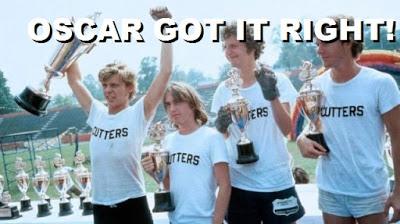Divorce, Italian Style (winner)
Freud
Last Year at Marienbad
That Touch of Mink
Through a Glass Darkly
What’s Missing

Once again, we have an embarrassment of riches for year and category, a pile of riches that is not clearly evident based on the five nominations. For whatever reason, the Oscar nominating committee was heavily into non-English films in 1962, at least in the Original Screenplay category. Even here, though, there are plenty of places to go. For instance, Cleo from 5 to 7 is a worthy film, as is An Autumn Afternoon. The Exterminating Angel was probably too weird for the Oscars, but I’d consider it. Staying in the foreign language area, Knife in the Water might get some consideration, but I’m saying that based on reputation since I haven’t seen it yet. A movie like Carnival of Souls doesn’t have much of a hope at the Oscars, and yet it manages to pull off an overused “twist” ending better than most. The Man Who Shot Liberty Valance is one of those cases where I’m not entirely sure if the film is eligible, but it’s worth considering. We can stick with westerns and bring up How the West was Won which seriously seems like a huge miss. The last one worth bringing up is Days of Wine and Roses, another film I’m a bit shocked to not see on the list.
Weeding through the Nominees

5. Anyone who knows me and/or this blog will not be surprised when Last Year at Marienbad ends up in last place here. This is the movie that officially turned the blog from a PG-13 rating to R, since that movie’s review caused a profanity-fueled rant from which there was no coming back. I hate this movie so much. While there are plenty of times when I simply disagree with a nomination, it’s rare that I’m this close to being offended by a nomination. Yes, I know this is a controversial opinion. I don’t care. This movie is shit.

4. The biggest problem with Freud is that it’s not very interesting. There are a lot of ways to make a film about Freud and his theories interesting and this film manages to avoid all of them. Some of this may well come from the rapidly-disintegrating world of Montgomery Clift at the time, which undoubtedly forced the film in particular ways. This is a film that I can’t imagine wanting to sit through a second time because there’s simply not enough here to warrant a second viewing. Freud deserved better, and that’s saying something.

3. I think it demonstrates the weakness of the actual nominations in a year this potentially rich that a flimsy nothing like That Touch of Mink is coming in third. There’s nothing really objectively wrong with the film for 1962, although it is ridiculously and painfully dated by today’s standards. But there’s no substance to this film. It’s airy and flighty and serves mainly as a showcase for Doris Day to be fashionable and for Cary Grant to be world-shatteringly wealthy. Beyond those two things, I remember almost nothing about it, and that bodes ill for a screenplay category.

2. Through a Glass Darkly is perhaps the quintessential Ingmar Bergman film in many ways. When I used to think of Bergman, I thought of that shot of Max von Sydow playing chess with Death (from The Seventh Seal) and everything I figured that entailed—existentialism, pain, slow-moving plots, angst, and black-and-white footage. Honestly, that’s so much more Through a Glass Darkly, an exploration of schizophrenia, than The Seventh Seal could ever be.
My Choice

1. Ultimately, Best Original Screenplay for 1962 puts me in a bit of a quandary. I would rework this set of nominations almost entirely, and Divorce, Italian Style would be one of the few films (perhaps the only) to make it to my list of nominations. And yet, this is one of those rare instances where the Academy nominated poorly in general but still managed to zero in on either the correct winner or a damn good one. In an open field, Divorce, Italian Style would be very much in the running for me; it still works and it’s still funny. It would compete with An Autumn Afternoon and Cleo form 5 to 7, but in cases like this, the tie always goes to the Academy.
Final Analysis

